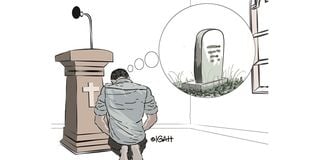Let's talk about suicide in church

A man doesn't just wake up one morning and commit suicide.
What you need to know:
- Suicide affects all humans, be they saints or sinners.
- Sadly, in many church congregations, mental illness is demonised.
Suicide. You won't hear this topic in any church sermon. Because? It's eerily unsettling. It generates zilch offerings. Plus, it doesn't give prideful preachers bragging rights.
Yet suicide is in the Canon, in black and white... and bloody red. A perfect example is Judas Iscariot.
This disciple killed himself right after breaking holy bread with The Bread of Life. Right after walking for 1,260 days with The Ancient of Days.
This tells me a believer may be in close proximity to God, and literally hear the voice of Jesus and behold him face-to-face - but still be susceptible to suicidal ideations. It also tells me suicide affects all humans, be they saints or sinners.
Real prophets
In the Bible, two prophets - Jonah and Elijah - had suicidal ideations. The former became suicidal after he'd singlehandedly brought about a nationwide repentance Nineveh. The latter became suicidal after going against Jezebel - the vilest and most dreaded queen in Israel's history.
These two prophets were besieged by suicidal thoughts after accomplishing mighty feats. Which tells me suicide doesn't only strike when a man's in a cataclysmic chasm.
A man can be on top of the world - racking in top dollar - yet feel like life is not worth living and a noose is the only solution.
Anatomy of suicide
Suicide is a complex condition. It can be both seen and unseen. It's both detectable and undetectable. It all depends on the perspective of those who are on the outside looking in: are they blind or are their eyes opened?
Here's the thing. A man doesn't just wake up one morning and commit suicide. He wrestles with suicide ideations, sometimes for years.
He sends innumerable SOSs, which he hopes helpers will decipher. And then, one sad day, when he's done all he can, he takes matters into his own hands.
Deception services
I've heard it said that church is like a hospital, which, on any given Sunday, caters to all and sundry. Sadly, in many church congregations, mental illness is demonised.
False prophets carry out supposed “deliverance services”, which demean and deceive suffering saints but enthrone the Chief Charlatan on a Christly pedestal.
Don't get me wrong. I believe in faith healing. I've seen miracles. But let's also normalise seeking treatment and attending therapy. Look, even Jesus Christ would ask the persons he healed to show themselves to the high priest.
In Biblical times, it was priests who gave healed souls a clean bill of health. Which means faith and science are faces of the same wellness coin.
At the bottom of every Christian TV channel are multiple numbers for people to give money and buy merch. I'm yet to see any faith-based channel that gives contacts for suicide watch. No wonder many men are cynical of preachers and politicians.
A pastor wrote to me several years ago. He confessed how he was depressed because his ministry and marriage were one the rocks.
Suicide scenario
“Each morning while driving to work, I do all it takes to resist the voice that's urging me to speed into an oncoming trailer,” he said.
And yet, each dawn and dusk, he had to intercede for his family and congregation. He had to be strong for everyone, yet all strength was gone from him.
Fortunately, this brother got help in the nick of time. If he hadn't and, God forbid, he committed suicide, everyone around him would’ve confessed that they didn't see it coming.
This suicide scenario is replicated in many ecclesia countrywide, right under the stony schnozzles of faux shepherds; who wouldn't know a diseased and dying sheep if its intestines were spiralling on the pulpit.
Churches can mainstream suicide-related services in their programs by leading with light and love.





